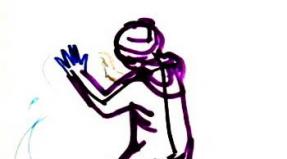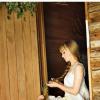What is Shrovetide for children. Shrovetide: the history of the holiday, traditions and customs. What to tell children about the traditions of the holiday
Probably each of us longingly awaits a wonderful folk holiday called Maslenitsa. Every self-respecting housewife strives to bake as many pancakes as possible, stuff them with cheese, honey, cottage cheese, sour cream, cabbage, mushrooms, etc. Here the flight of fancy is unlimited. In addition, women fuss around the stove to cook a lot of amazing dishes and decorate the table with stewed vegetables, fish, sweets, pies, pie, baked pike, caviar, pickles. Moreover, with the onset of the last days of winter, the mood of the majority rises, there is a desire to have fun, get out of the “fetters” of the cold and take walks, chat with friends face to face.
Modern people with great pleasure continue to observe the rituals and traditions of Maslenitsa, perform incredible deeds - climb a wooden pole, jump over a fire, arrange loud festivities. Why this happens, what joyful days and fuss in the kitchen are dedicated to. Let's find out about everything in order, and in addition we will save a couple of other excellent pancake recipes that have been preserved from our ancestors.
History of Maslenitsa
Great artists and writers dedicated their creations to this holiday, the best directors made films about it. Let us recall at least the amazing picture of Kustodiev “Pancake week”. How beautiful she is. You just want to be in the world that the artist has reflected and enjoy the true Russian winter, incredible dishes made exactly according to Russian traditions. But before delving into our fantasies, let's study the history of the many-sided and ours, only the Russian holiday of Maslenitsa.
It should be noted right away that the celebrations we describe have nothing to do with the Orthodox religion. This holiday was bestowed by us by our ancestors, who worshiped pagan gods. Perhaps this is one of the few manifestations of paganism that survived with the transition to Orthodoxy. In order to avoid any disagreements, our Church included the holiday in its list, but called the period of celebrations Cheese Week (Meat Week). This period of time passes just before the start of the next Great Lent.
When did Maslenitsa arise?
There are several versions of the occurrence of special celebrations. Judging by one of the interpretations, this week it was no longer possible to eat meat dishes, but it was still allowed to consume dairy products. Among the people, the celebrations that lasted for seven days were called differently: Kasatochka, Tselovalnitsa, Obyedukha, Merry, Perebukha, Honest Maslenitsa, Sugar Lips, etc.
During the celebrations, incredible traditions were performed - they rode horses, which they tried to decorate with the most expensive and beautiful harness. Sleighs rushed through the streets, and in front of them was the very “Troika Bird”, which great artists immediately undertook to personify on their canvases. The youth reveled, sang songs, merry-go-rounds were launched. Fairs, amazing in terms of the richness of the assortment, were held on the squares, where it was possible to purchase goods at a bargain price. On the slides that still retained snow and ice, people descended on large sledges decorated with beautiful ornaments. "Snow" battles were arranged, fortresses and cities were built from snow and ice.
How was Maslenitsa
In the 17th-19th centuries, a crowd of not only adults, but also children gathered in the center of the square. These seven days were supposed to be the most generous of the year. The children were handed out sweets, pies, toys. And in the center of the squares, stages were set up on which performances took place. The main characters were mummers - Maslenitsa and her companion Voevoda. Of course, the plot for the comedy was the days of Maslenitsa, its treats. She said goodbye and promised to return next year. Other performances could also take place on the stage, which reflected the works of great creators, stories based on real events.
Despite the past centuries, the celebrations on Maslenitsa week did not stop. And the main message remained - the desire to drive away Winter. In order for warm days to come faster, they sang Magnificent songs, turned to the god Yarila and asked him to manifest himself as a solar disk and its rays. The symbol of the festive celebrations was a large straw effigy, on which a woman's sundress was put on. On the last day of the festivities, they burned him or “buried” him by putting a large pancake in his hand.
Why damn it
Many are interested in the question - why exactly pancake is a symbol of Maslenitsa. After all, they are baked during this week by all the housewives, and in incredible quantities. We have already mentioned the fillings, because there are also a huge number of them. Fortunately, the Russian land is rich in gifts, and people have always been distinguished by high diligence and had everything necessary for excellent nutrition in their farmstead. But back to pancakes and the history of their rise.
The tradition of baking them has appeared since ancient times, namely from the era of paganism. Worshiping those gods, people turned to the main of the pantheon - Yarila. And he was nothing more than the Sun, which warms the earth with its rays and gives life to all living things. With its bright arrival, winter gave way to spring and arable land started, bread was sown, people took off their heavy sheepskin coats and rejoiced in the warm air. And what is so similar in shape to our warm sun? And what can you taste while enjoying its taste? Damn of course. Thin bread, in which there is nothing but flour, eggs and milk, was prepared both in rich houses and in poor huts. Thus, the hostesses tried to embody the image of Yaril with their own hands and treated their creation to children, friends, relatives. In addition to wheat, buckwheat, corn, oatmeal were used for manufacturing.
Representatives of the poor class, having no stocks of meat and milk, and derivative products, invested semolina, pumpkin, pea porridge, etc. as a filling.

Customs for Maslenitsa
For a long time there were customs that were mandatory performed in every home. For example, the first loaf made had to be given to a poor person so that he would commemorate the deceased from this house. If there was no beggar nearby, asking for alms, they threw the product through the window. And while Maslenitsa week lasted, soft bread was eaten throughout the day and week, changing fillings and dressings. Each new day of the solemn week had a certain meaning, and rituals were performed that were intended specifically for this day.
Before the onset of Maslenitsa on Sunday, it was necessary to go on a visit to relatives, dear friends and close neighbors. It was also necessary to invite guests to your place and lay a rich table. This was the last “free” day before the strictest fast, when natural meat was consumed. It was called "Meat Sunday". There was even a funny belief - the father-in-law goes to the son-in-law to finish the meat.
Monday - Meeting
The day of the meeting of the holiday is called "Meeting". In the daytime, all people gathered for festivities. Large snow hills, fortresses, cities of ice and snow were built. People rode on carousels, huge tables were laid on the market squares, samovars were boiled, herbal teas were poured, honey, cream, etc. were poured. The kids together made a straw doll and put on a sundress, a kokoshnik. From the very morning, the children walked around the yards and sang songs, and they, in turn, were treated to pancakes and sweets. This went on until the middle of the day, then everyone ran to the snowy mounds and rode on makeshift sledges. Adults were an exception, they had the right to such pleasures only from the middle of Shrovetide week.
Tuesday - Play
This day was for the couple. It was on Tuesday that weddings were held in the villages, and after a rich feast, all the newlyweds and those who had just joined went for a ride from the hills. Naturally, they continued to bake bread and feast on the people. Also on the day of the game, young people looked at the opposite half and picked up a mate for themselves.
Wednesday - Lakomka
This day can truly be considered the moment of the “Great” truce, the mother-in-law specially “invited” her son-in-law to a pancake meal. No wonder there is a saying "To the mother-in-law for pancakes." Young people must dress in outfits that they wore on their own wedding day, and unmarried girls rode down the hills. And over the single guys, who could not find a couple last year, everyone made fun of and made fun of. They came up with all sorts of punishments, and the guys had to pay off.
Thursday - Walk around
It was also called Fracture, Rampant, Chetvertok, Wide. This is the central event. All honest people gathered in the squares, staged performances, fistfights, all the swings and roundabouts were spinning, snowy fortresses and cities were taken under siege. Remember the masterpiece of art "The Capture of the Snowy Mountain" by Surikov. From clothes they put on whatever came to mind. And a scarecrow made of straw - Maslenitsa was raised to the highest hill.
Friday - Mother-in-law Vecherki
On this day, the opposite happens. It is the son-in-law's turn to treat his beloved mother-in-law with pancakes. He invites a relative to the house and at the same time lays a rich table. But the mother-in-law gave food and equipment for making pancakes: a frying pan, a tub, flour - a whole bag, butter. Thus, due respect was given to relatives by the wife. And the festivities continue, people triumph in the markets, drink tea and ride on carousels.
Saturday - Seeing off (Zolovkin gatherings)
This is one of the most beautiful traditions - a young daughter-in-law invited relatives to her new home and treated them not only to pancakes, but also to other dishes. And people picked up a Scarecrow made of straw - Maslenitsa and carried it through the streets of the village and “buried it: they collected a lot of logs, set the Scarecrow upstairs and set it on fire. Round dances were arranged around a large fire, songs were sung. Despite the playfulness of the performance, many people cried - after all, another year was leaving, the holidays were ending, and it was necessary to start worries.
Sunday - Forgiveness
On the eve of Lent, everyone wanted to be cleansed of sins. People asked each other for forgiveness and said the following words: "Forgive me, please, if I am guilty of something before you." In response, the usual for all of us, “God will forgive,” sounded. The ritual did not have a formal meaning, indeed people forgave each other insults, insults, forgot about troubles and shook hands. Also on this day, it was necessary to visit the cemetery and “treat” the dead with pancakes, leaving them on the graves.

Divination was very popular these days. And, as a rule, the fair half is more interested in this activity. So, the girls performed the following rituals:
- Picking up the first pancake, the girl went to the street and treated the first guy who met on her way. His name meant that that would be the name of her betrothed.
- Before going to bed, the girl had to hang a towel outside the window and whisper the words: “Betrothed, come, wipe yourself with a towel!” The next morning she checked - if the towel turned out to be wet - then this year a marriage was coming. Dry - on the contrary, you should not expect a betrothed.
- For the third rite, you need to collect branches of coniferous trees (pine, cedar, fir, fir). It is better to collect in the forest and spread out at home on the floor. Invite a friend, tie scarves over each other's eyes and choose branches at random:
- if a girl picks up a thick branch with dense foliage (needles), she is waiting for a marriage with a strong and respectable man.
- a flat and smooth surface portends an attractive spouse.
- if there is a thick and strong bark on the branch, the husband will be a wealthy person.
- if the whole bark is peeled off, then a simple guy will become a spouse, perhaps a small employee, a locksmith, a carpenter.
Whether it is worth believing fortune-telling - decide for yourself. But it is unlikely that a towel or a spruce branch can predict your future. In any case, the rituals were invented by people and they are needed only as entertainment. And you need to believe only in the positive, no prediction should leave a residue of uncertainty in the soul.
On Forgiveness Sunday, it was possible to drink alcoholic beverages for the last time before Lent.

The best pancake recipes
So, before we start baking pancakes, let's find out one more story about Maslenitsa. The legend originates from the northern regions of Russia, where winters have always been rich in snow and blizzards. So, according to this story, Her Majesty Maslenitsa appeared in the North, where Santa Claus ruled. One peasant was looking for needles and saw a little girl, Shrovetide, behind the trees and asked to return warm days and joy to people. And she agreed and appeared before people not in the form of a little girl, but a strong, beautiful and ruddy beauty. With her infectious laughter, she drew the people into festivities, arranged round dances and sang songs.
To make it pleasant for you to spend these days before Lent, we offer some of the best pancake recipes. Believe me, if you follow the recipe, then not a single pancake will turn out to be lumpy.
On milk
This is the most popular type of pancakes, which will not take much time from the hostess. For cooking we need:
- half a liter of milk;
- 2 testicles;
- 200 grams of flour;
- 2 table. tablespoons of vegetable oil;
- 1 table. a spoonful of granulated sugar;
- a pinch of salt
The ingredients must be taken out of the refrigerator in advance so that they reach room temperature. In a bowl, beat eggs, add sugar, salt, pour in milk and mix thoroughly.
Mix the flour with a small portion of milk until the state of sour cream, mix until the lumps disappear.
Pour into the main composition and beat briefly. Pour vegetable oil, mix and set aside for half an hour at room temperature.
On kefir
The option is economical for zealous housewives. You can also use curdled milk. For cooking we need:
- half a liter of sour milk or kefir;
- 2 testicles;
- 200 grams of flour (wheat);
- drinking soda (half a teaspoon), the same amount of salt and sugar;
- 4 tablespoons (tablespoons) vegetable oil.
Beat eggs, pour in kefir and mix thoroughly. The mixture must be heated to 60 degrees, so that after adding the salt and sugar are completely dissolved. Gently fold the sifted flour into the composition and mix so that there are no lumps. Dissolve soda in a tablespoon of boiling water and pour into a bowl of dough, then pour in the oil, mix and set aside for one hour.
On the water
This is perhaps the most popular pancake recipe. It does not contain milk, which is not suitable for everyone in terms of physical indicators, kefir, which can cause bloating. In such a test, there are fewer calories, which means that there are chances to keep the figure during the Maslenitsa period. So, we need:
- half a liter of water;
- 320 grams of flour (wheat);
- 2 testicles;
- 2 table. tablespoons of vegetable oil;
- a tablespoon of granulated sugar;
- a pinch of salt.
Beat eggs, salt and sugar in a bowl, pour in water (warm) and gradually introduce the sifted flour. Beat until smooth.
We recognize the character by fillings
Of course, eating just pancakes is also a pleasure. But how much more nutritious and satisfying are pancakes with mushroom, cottage cheese, cabbage, sour cream filling. There is a belief among the people - the filling should correspond to the male character. Let's find out how true this is.
- Just pancakes smeared with butter. Such a product is preferred by restrained and calm individuals. They strive to be and communicate only with decent people. Men with such taste, as a rule, are good fathers and loving husbands, guarding the reputation and well-being of the family.
- Caviar is preferred by creative, smart people. They are pragmatic, caring, the affairs of the family and its well-being come first. They are not capable of romantic deeds, if they decide to do something pleasant, they will rather take practical steps.
- With sour cream, tender and sensitive types regale themselves. Such men are very vulnerable, touchy. Even a carelessly thrown word can lead to hysteria and mood damage. So be careful and decide whether it is worth linking your fate with him.
- Emotional and romantic men love with honey. This type will be able to create a holiday even from a banal meeting and will delight his soul mate with pleasant surprises with or without reason. These men are monogamous and can give their last penny for a bouquet, if only their beloved is happy.
- With salmon people prefer pancakes with an extreme orientation. These are travelers, skydiving enthusiasts, etc. So life with such a friend is hectic, every now and then he will present another surprise in the form of hiking on the highest mountain, or hang-gliding.
- Cottage cheese stuffing is loved by men who will remain children until the end of their days. They love everything sweet, and the wife will be a mommy. Get ready - making decisions, paying bills, sorting out relationships will fall on your fragile shoulders.

How to bake pancakes
And now let's move on to the process, which some housewives are concerned about. It is because of the moment of baking that women are ready to refuse to cook such a tasty and light dish as pancakes. And it all consists in only one thing - they stick to the pan, become a lump. To get around all this, we suggest acting according to a proven plan.
- The pan must be put on fire and heated well.
- Lubricate with vegetable oil (thin layer, 1-2 drops and a brush are enough).
- Reduce fire intensity by half.
- Mix the settled dough, as sediment always forms at the bottom.
- Take a small portion with a ladle (it is better to use a special one for pancakes).
- In a frying pan, which must be held in an inclined position, pour the dough and twist so that it completely covers the surface.
- Bake for a maximum of 2-3 minutes, turn over with a spatula. After a couple of minutes, transfer to prepared dishes.
- Lubricate the pancake with butter or cover with a large lid so that the edges become soft and do not break.
The Maslenitsa holiday, beautiful in its course, is not only festivities and celebrations. People thus wanted to get closer to the secrets of the universe, to open the curtains of death. According to another version, the shape of the pancake does not reflect the Sun, but life, that is, existence without beginning or end. These days, people understood that the earth should increase its wealth and in their songs they sang the melting of snow, which nourishes the soil with fertility.
Another sacred basis of the holiday is the remembrance of the dead. The funeral feast included three components - lamentation for the departed, the offering of a sacrifice and a rich feast. It was believed that the dead came to each of the celebrations of people and invisibly took part in them.
Be that as it may, Maslenitsa is a beloved and unlike anything in the world holiday of the Slavs. Let it be the remnants of pagan times or Cheese Week according to the Orthodox religion. The main thing is that it is tasty, fun and very useful, of course, if you know the measure!
Maslenitsa is one of the oldest Russian folk holidays, the essence of which is seeing off winter and meeting with spring. How to celebrate Maslenitsa? How to congratulate? What signs to pay attention to? How to bake pancakes? How to guess?
One of the oldest native Russian holidays - Pancake week. This is a national holiday of seeing off winter and meeting with spring. The ancient Slavic holiday came to us from pagan culture and survived after the adoption of Christianity.
Maslenitsa is one of the holidays that make up the moving part of the calendar. The date of its holding depends on the date of the main Christian holiday - Easter. According to the Orthodox Paschal, the celebration of Maslenitsa begins 56 days before Easter.
Shrovetide- so colloquially called cheese week- the last week before Lent.
This is the preparatory week for Lent. In the Christian sense, it is dedicated to one goal - reconciliation with others, forgiveness of offenses, preparation for the repentant path to God.
During Maslenitsa, Orthodox Christians, according to the church charter, do not eat meat, but eat fish and dairy products.
Maslenitsa in Russia
Preparations for Maslenitsa started from the middle of the previous week. At this time, the housewives cleaned up all corners of the house - from the attic to the cellar: they refurbished the whitewashing of stoves, scraped tables, benches and floors, prepared festive dishes for use, swept garbage from the yard and in front of the gate. They bought a large number of products for the holiday: flour of different varieties for pancakes, spinners and pies, salted fish, gingerbread, sweets and nuts for children, they collected milk, cream, sour cream and cow butter.
Saturday on the eve of Shrovetide week was called "little Shrovetide". On this day, it was customary to commemorate the dead parents. For them they baked a special treat - pancakes - and put it on the shrine, dormer window or roof, left it on the graves in the cemetery, and distributed it to the poor in churches. Shrovetide celebrations began on Monday next week.
Shrove week is traditionally the most fun of the year. Each day of the week had its own name:
Monday - meeting
Tuesday - "tricks"
Wednesday - "gourmet"
Thursday - "revelry", "fracture", "broad Thursday"
friday - mother-in-law evening
Saturday - "sister-in-law gatherings"
Sunday - "seeing off", "forgiveness", "forgiveness day".
The most important were considered the last four days of the holiday, called "wide" or "reckless Maslenitsa". On the eve of them, they should wash themselves in the bathhouse, "cleansing" themselves of the hardships and misfortunes of the past year. In the houses, permanent work was stopped, they began to visit relatives and friends.
Plentiful hearty tables of flour and dairy food, as well as eggs, fish dishes, pies, kvass, and beer were laid on Maslenitsa. At the festive meal were necessarily present pancakes - a pagan symbol of the sun and an obligatory attribute of commemoration.
How to bake pancakes for Maslenitsa
Maslenitsa coincided with the performance of a large number of rituals associated with honoring "newlyweds"- young spouses who got married this year. They were rolled in the snow, rolled from the mountains on frozen animal skins and sledges, and planted on overturned harrows.
Everywhere the main celebratory action was roller coaster- on sledges, animal skins, overturned benches, icy troughs and sieves. In the north and in the villages along the Volga, parallel poles were laid on elevated places for Shrove Tuesday for young people to ride in pairs. Also, well-dressed youth rode horses, moving from village to village with noise, songs and playing the harmonica. Horses were decorated with ribbons, flowers and ringing bells.

During Maslenitsa week in the Cossack settlements of Siberia, the Urals and the Krasnoyarsk Territory, as well as in the Simbirsk, Penza and Tula provinces, the game was spread "The Taking of Snowtown". The tradition of building fortresses or towns from packed snow has been known since the beginning of the 18th century.
On the last day of the week in the provinces of Russia, seeing off Maslenitsa. In some localities, the ritual was in the form of burning a Shrovetide effigy, in others - in the form of funeral wires.
The last Sunday before the start of Lent is called Forgiveness Sunday. On this day, after the evening service in the temples, a special rite of forgiveness when clergy and parishioners mutually ask each other for forgiveness in order to enter Great Lent with a pure soul, having reconciled with all their neighbors.

Signs for Maslenitsa
Maslenitsa traditionally should be held very richly and cheerfully. People should not skimp on treats - as you spend Maslenitsa, the year will pass.
♦ If the hostess' pancakes turn out beautiful and lush, then the year will be prosperous and rich in harvest, and if they stick and do not work out, then wait for trouble in the year.
♦ The more pancakes baked in the house on Maslenitsa, the richer the house will become, and if the hostess bakes few pancakes, then there will be no harvest.
♦ Each baked pancake was associated with the sun, so one pancake is one sunny day. And the more pancakes, the more sunny days.
♦ In the middle of Maslenitsa, the mother-in-law must definitely call her son-in-law for pancakes, and if the son-in-law likes the pancakes, then they will live in peace and understanding for a year.
♦ If it was raining on the eve of Maslenitsa, then autumn promises to be full of mushrooms, and if it is frosty, then the summer will not be hot and the harvest will be good.
♦ Whoever is stingy with treats on Maslenitsa will go bankrupt in a year. It is believed that it is unexpected guests who bring happiness to the house on Maslenitsa.
♦ If old things are thrown out on Maslenitsa, then this year there will be new new clothes.
♦ On Maslenitsa, if a person can forgive, then he will be able to let something new into his life.
Divination for Shrovetide
First of all, they guessed at Maslenitsa on the first baked pancake. It was used to determine what awaits during the year until the next Maslenitsa:
♦ If the pancake turned over easily, this year you will get married.
♦ If the pancake sticks to the pan - another 3 years to sit in the parental home.
♦ Smooth edges of the pancake - there will be a happy marriage.
♦ The edges are uneven, torn - you need to think about whether you are going to get married.
♦ If there is a bake in the middle, the husband will be faithful. If from the side, he will start looking at his neighbors.
♦ How many holes in a pancake - so many children on the benches.
♦ A beautiful ruddy pancake - there will be a lot of health, pale - to diseases.
♦ Thin pancake - to an easy life, thick - to work.
♦ On Shrovetide Sunday, they baked pancakes with various fillings and treated passers-by. It was noted who would be the first to take a pancake: a man or a woman - the child will be born of this gender. All pancakes will be taken apart - a happy fate awaits. How many pancakes will remain - so many years to sit in the girls.
Practiced on Maslenitsa divination on the betrothed.
On any evening of Pancake week, the girls hung a clean towel outside the window. At the same time, they said: "Betrothed, show yourself, dry yourself with a towel." In the morning the towel was checked. If it was dry, then the girl was not destined to get married for another whole year, but if the towel was wet, then it was possible to prepare for the wedding. The wetter the towel was, the sooner the wedding.
Fortune telling on the Shrovetide pie about the fulfillment of a wish. Bake the cake, and while the cake is warm, it must be covered with a cloth napkin. Then take a knife and dip it into the Epiphany water. Remove the napkin from your pie and wipe the knife with a napkin with the words: “Just like water from a knife, so thinness from a house. We eat royal and boyar pies. My friend-pie, open the vow to me. Then sprinkle the cake with Holy water, make a wish and stick a knife into it.
♦ The knife remains straight - everything will remain unchanged.
♦ The knife leaned in your direction - the wish will come true, but you yourself will prevent it from quickly being fulfilled.
♦ The knife deviated from you - the desire will not come true, you create obstacles for yourself.
♦ The knife deviated to the right of you - the wish will not come true.
♦ The knife deviated to the left of you - the wish will come true.
♦ If the knife fell - failures await you this year.
Fortune telling on love and personal life on pancakes with stuffing.
To do this, the girls gather together for Maslenitsa and bake pancakes with different fillings. As a filling, they use: honey, mustard (you can pour mustard on the meat), raspberries, condensed milk, red caviar. When the pancakes are ready, someone who is not involved in divination is called to help. This person should hand out pancakes without looking. Each of the girls takes a pancake that comes across to her and checks with what filling it is.
If it comes across with honey - this is for an imminent wedding, with milk - the birth of a child, with mustard - a bitter separation from a loved one, with raspberries - unexpected and passionate love, and if with red caviar - then the year will be financially profitable, but there is nothing good in love wait.

Shrove Week: Traditions and Customs
♦ Starts at Monday, and by this day people made slides, swings, cooked pancakes and pastries, and the kids created a Maslenitsa doll from straw, dressed up and decorated it. Then they gathered and went with songs and dances from house to house - they were treated to something - either a pancake, or another goodies. The very first pancake that day was in any case a “commemorative” pancake, regardless of whether they gave it to the children or ate it themselves.
♦ Tuesday, which was called "Zigrysh", this is the day of the newlyweds. Weddings were played a week or two before Maslenitsa, and on Shrovetide Tuesday all the young couples went to ride the slides, and then they also went to treat themselves to pancakes in all the houses. Those young boys and girls who have not yet been bound by marriage, on this day looked after their grooms and brides.
On this day, single girls often guessed at their betrothed. It was supposed to take a pancake, go out into the street and treat them to the first man they met, asking his name. It is believed that this is what the betrothed will be called.
♦ Wednesday, or gourmet, as she was called this week, suggested family communication - sons-in-law went to their mother-in-laws for pancakes, dressed up as on their wedding day. It was a must-have event to bring the whole family together. Unmarried youth rode down the hills, met and talked. The guys who did not marry this year, the residents joked, and in order to be left alone, they had to pay off with sweets and pancakes.
♦ Thursday, or take a walk, was the first day when not one category of people was supposed to have fun, but all at once. People gathered with whole families, arranged fisticuffs, fought for snowy towns, had fun and talked. On the same day, it was supposed to solemnly deliver the stuffed Maslenitsa to a high mountain.
♦ Friday- "mother-in-law evening." This time, the mother-in-law was already on a friendly visit to the family to the young, and she was treated to pancakes, but in advance the mother-in-law herself had to send her son-in-law all the necessary ingredients - butter, flour, and even a frying pan. Such a meeting was an honor for the wife's family, and all those present rejoiced from the bottom of their hearts.
♦ Saturday popularly nicknamed "sister-in-law gatherings." The day was marked by the Maslenitsa signs and custom that the newlyweds invited all their relatives to their place. This day was accompanied by elements of the show - for example, on Saturday it was supposed to burn an effigy, which had previously been taken to the mountain.
♦ Sunday has long been called "forgiven". Monday is the strictest fast of the year, which lasts 40 days. Before this time, it was supposed to cleanse your soul from hardships and approach everyone with whom there were omissions or problems to ask for forgiveness. The answer was to say: "God will forgive."
On this day, for the last time before fasting, it was allowed to drink alcoholic beverages, since during the entire fasting one must give up not only meat and sweets, but also alcohol, tobacco, intimate life and all kinds of joys.

Congratulations on Maslenitsa
♦ I'm on Maslenitsa to you
I wish you joy
Let him be rewarded for his deeds!
Sorrows not knowing
You live well
Fun and friendly.
A miracle holiday has come to us,
Mark as needed!
♦ We spend the winter with pancakes,
Donuts, cheese and pies,
Maslenitsa - the end of winter,
The beginning of love and spring.
♦ Everyone is celebrating Maslenitsa, everyone is walking:
eat, drink, wish health to each other!
The more pancakes you eat today
The more fate will release years!
We burn the winter effigy without malice,
After all, even without winter, live and try!
But it's time for spring to give her the throne
And the hour for all nature around to bloom!
♦ No matter how much we eat
On cheese week
Everything will go well for us -
Just give me time!
So, eat hearty -
Belly is not visible!
Eat in reserve!
Happy Shrovetide to you!
♦ Maslenitsa is
Oil, vodka, pancake.
Don't keep it until summer
Old rubles.
Let the recipe be tricky
We are not fools.
Get half a liter
Soda and flour.
Vodka - from wheat,
Butter is from cows.
How can you not get drunk?
Well, be healthy!!!

♦ The noise of the festivities does not subside,
The street is bright...
Oh how wide
Came to visit us!
And, of course, I had to say
At this glorious hour:
Be happy, healthy!
Happy Shrovetide to you!
♦ Happy Maslenitsa, friends!
All relatives gathered today,
This is a national holiday
Let's bake pancakes together
And we will walk, have fun,
As the cold winter turns into spring,
Let sorrows go away with melt water.
Let happiness wake up like a spring flower
And joy and fun will be with you!
♦ Pancake is ruddy, pancake is beautiful,
Like the sun in spring.
Such a couple - everyone can immediately see
That spring is coming into the yard.
With Shrovetide!!!
♦ I see a dream of the two of us
We drink vodka behind the fence,
We dip pancakes in oil,
Let's not rush to eat.
Here is such a parsley,
Happy Shrovetide, my dear!
♦ Like this carnival
I will bake a loaf
So that everything has enough light
And beloved friend.
And I wish you
So that there is prosperity in the house.
So that always, without despondency,
Have fun and live honestly!
♦ We will burn a scarecrow,
Let's drive the winter away.
We will drink with you
And eat pancakes.
I congratulate you today
I wish you on Maslenitsa
Enough to eat pancakes
And warmed by the warmth of the fire!
♦ This holiday brought joy to everyone's house,
Such a long-awaited sweetness,
The aroma of pancakes wrapped at home,
Around the laughter of girls, guys.
So let's celebrate Maslenitsa together,
We'll bake two hundred pancakes,
I wish you, brothers, happiness,
May there be no bad weather in your life!
♦ Happy Maslenitsa, friends!
All relatives gathered today,
This is a national holiday
No one will be hungry today.
Let's bake pancakes together
For all Cheese Pie Week,
And we will walk, have fun,
Sing songs, tell stories.
♦ Our people - I give you my word! -
For a long time from year to year
At the end of the harsh winter
Looking forward to Maslenitsa!
Winter day is frosty
Damn like the sun - a yellow circle,
And it remains for me to say:
With Maslena you, my friend!
♦ Great post soon, soon,
And until Easter we
Do not eat pickles -
Just look around;
In the meantime, it's easy, free
Maslenitsa rushes to the dance,
What am I with today
And I want to congratulate you!
♦ Paradise for the population of the entire large country -
Everyone eats pancakes all week long!
Mother-in-law, and sister-in-law, and mother-in-law, and son-in-law -
All guests are invited! Don't forget to take
A good bottle is no accident:
To remember longer even in the days of fasting
Warm company, delicious food ...
With Maslenitsa, in general! I'm leading to this!
♦ Once upon a time Russians
(I'm talking about men)
Having eaten pancakes with sour cream,
They fought with fists.
Those days are gone and we won't
Break the order now;
We, quietly drinking, will tell people:
Hey people! Happy Maslenitsa!
♦ The holiday has a deep meaning
And the meeting of Zimushka with Spring,
Therefore, our people love
On Maslyana walk in a crowd!
And wishes are simple
People send each other on holiday:
Let the relatives be healthy
And in the house - satiety and comfort.
♦ Happy Maslenitsa! Comfort and warmth!
So that life is both full and joyful!
♦ Today is a festive and delicious day!
Maslenitsa, a holiday - the day of pancakes!
Here I congratulate you!
We will sing songs to the roosters.
And then comes the great post,
And then think about the eternal.
Let's have some fun today
Maslenitsa is a holiday for the careless!
♦ The air smelled of spring
Or do pancakes smell like that?
We are celebrating Shrovetide
In anticipation of spring.
And the frost is such a prankster
Stings the nose, does not lag behind.
May this holiday be wonderful
It will bring you joy.
♦ At the end of winter, before Lent
Our people have been walking for a long time.
Delicious Maslenitsa comes to us,
She is generous, dances and sings.
Congratulations on the holiday of hope
Let the winter and cold go.
Let Maslenitsa bring joy
And eyes always shine with happiness!
♦ Winter is leaving, have fun folks!
Shrovetide rings with joy.
Jokes, laughter, music, fun.
Before Lent, the festivities are in full swing.
Happy holiday to you
We will eat plenty of pancakes.
Look, spring is just around the corner
Let happiness stir your blood.
♦ Last winter days
Lives not alone:
We all follow her
We wish you a rest!
And now we're waiting for spring
Already traces of her are visible!
Let it warm us with you.
With Shrovetide! And with Spring!

♦ Winter has come to an end.
And you can all week
See her off with pancakes
With fun and merriment.
I want you on this holiday
congratulations from the bottom of my heart!
Let him be happy!
Let him have fun
And raise the mood
And set up for spring!
It's good that we can
Arrange festivities!
♦ We are waiting for you at Maslenitsa!
Let's meet with a butter pancake,
Cheese, honey, kalach
Yes, with cabbage pie.
The Great Fast awaits all of us,
Eat up, people!
Walk all week
Eat all stocks.
And the Forgiveness Day will come,
We are not too lazy to bow,
Come Sunday -
We will ask for forgiveness
To remove all sins from the soul,
Meet fasting with a pure heart.
Let's seal friendship with a kiss
Even though we don't fight
After all, on Maslenitsa you need
Strengthen friendship with love.
Come visit us
We will be glad to guests!
♦ Congratulations from the bottom of our hearts
And we cordially invite:
Throw all worries
Come to visit,
Straight to our front porch
To us for Maslenitsa.
See for yourself:
Let's eat pancakes
On sour cream donuts,
Lush pies,
February - wave,
Martha - "hello" say.
♦ Happy Shrovetide, we congratulate you,
The time has come for the pies to rule.
Without pancakes, the farewell of winter will not work,
We invite you to the song, to the joke, to the joy!
♦ Baked pancakes in the oven
On Shrovetide week
I hurry to come to you
I'm visiting, in fact.
Eat delicious pancakes
Drink fine wine
Dancing with you all evening
Have fun, sing and walk.
♦ Today we drive out winter together!
It's time to lead the spring!
Let's have fun on Maslenitsa!
Kids frolic in the cold!
We invite you, dear guests!
Let's celebrate the holiday together!
We serve hot pancakes!
Let's congratulate each other on spring!
♦ Girlfriend, I invite you to pancakes!
Let's celebrate this day with you!
Pancakes are wonderful - delicious, lush,
I baked a lot, because I'm not lazy!
Happy Maslenitsa, dear, to you.
Let's sit down for tea, as we used to!
Be healthy, happy, loved.
And in life, so that everything is enough for you.
♦ Like Shrovetide
Pancakes flew out of the oven!
From the heat, from the heat, from the oven,
All blush, hot!
Shrovetide, treat!
Give everyone pancakes.
From the heat, from the heat - take it apart!
Don't forget to praise.
♦ Soon the sleepy land will open its wings,
Awakening will come with the cry of a crane;
February itself recognizes the change of days,
Through the heavenly veil, solar horses
Sends, like messengers, Spring to gray houses:
- Wake up from sleep! she says.
And dead ice melts in the cold hearts.
A trio in bells rushes - Maslenitsa move ...
♦ Turn around, swing - oh, walk the soul!
Life is like an apple on a saucer - wonderfully good!
In the cold, the scarlet complexion glows with heat.
Today is Maslenitsa week, Maslenitsa!
It pulls with a warm, delicious spirit, the sun beckons.
And it took off, as if with joy at its zenith.
An endless stream of motley round dance.
And until the lean period amuses the stomach.
Help yourself - with honey, with butter, spicy and tasty,
A generous slide of satin - these are pancakes for you!
♦ Pancakes are being baked... There is a cheerful child...
On Maslenitsa, fast is everywhere!
Today in Russia, as they say,
Forgiveness Holy Sunday!
And so, in the name of such a day,
Kohl was guilty of something,
Forgive me, please!
And I forgive you for everything!
♦ Today we rejoice -
Saying goodbye to winter
With pies and pancakes
In the noise of a cute mess.
Sledges are flying down the hill,
The eyes of a girl are burning
Songs, dances and festivities
What a day in a row.
Young people are not too lazy to look
Named all day:
Grooms - girls
And brides - guys,
And at the mother-in-law on pancakes
The son-in-law grunted contentedly: - Ah!
Ate, probably, about forty pieces -
What a festive swing!
This is Carnival
Miracle - Maslenitsa.

♦ Like a red maiden
Carnival has come to us!
So let's have some fun
After all, she brought us
Wonderful hotels.
Here, look: caviar, pancakes.
Only happy faces
This day must be celebrated!
♦ Drink, walk, my friend today -
Shrovetide at the gate
Many blessings of the Lord
Let this day carry.
A mountain of ruddy pancakes,
A sea of loyal friends
And also - from the happiness of drunks,
Fun people!
♦ People have fun on Maslenitsa,
The girls are walking and dancing
And for the guys - pancakes and more,
After all, you need to walk longer!
Sour cream, jam and honey -
All this goes well with pancakes.
Hurry up and fly
Celebrate the holiday with us!
♦ Winter meets spring
On this frosty day
On the streets crowded people
And don't be lazy to celebrate.
They know that spring will come
Her footsteps are heard!
And this means that with winter
We must forgive!
♦ Maslenitsa, what a day:
pancake flavors,
And folk festivals
Noisy and long!
Congratulations on this day
Everyone we live next to
Everyone who is far away
And won't try pancakes!
♦ Stir, brothers, dough,
After all, the end of winter has come.
From now on she will have a place
Except in Kolyma.
Drunk face to drunken face
Stand on Shrovetide in a row.
You can't spoil vodka with oil,
As the people say.
Soon-soon crane
The wedge will crawl back.
So on a pancake holiday
Spread out like a pancake!
♦ Morning... MONDAY... "MEETING" is coming.
Bright sleds glide from the hills.
All day fun. Evening is coming...
Having rolled in plenty, they eat all the pancakes.
"ZAGRYSH" careless - TUESDAY joy.
All walk, frolic came out as one!
Games and fun, and for them - a reward:
Sweet and ruddy Shrovetide pancake!
Here WEDNESDAY fits - "Gourmet" is called.
Each hostess conjures at the stove.
Kulebyaki, syrniki - they succeed in everything.
Pies and pancakes - all swords on the table!
And on THURSDAY - the wild "Razgulyay" comes.
Ice fortresses, snow fights...
Troikas with bells enter the fields.
Guys are looking for girls - their betrothed.
FRIDAY has come - "EVENINGS at the mother-in-law" ...
Mother-in-law invites son-in-law for pancakes!
Eat with caviar and salmon, it can be a little simpler,
We ate with sour cream, honey, butter.
SATURDAY is approaching - "SIS-IN-LAW TREATMENT".
All relatives meet, lead a round dance.
The holiday continues, the general fun.
Gloriously seeing off Zimushka people!
SUNDAY bright comes quickly.
Everything relieves the soul in the "FORGIVENESS DAY".
Straw scarecrow - Zimushka - is burned,
Having dressed in a sheepskin coat, felt boots, a belt ...
Lush festivities The fair crowns.
Goodbye, Maslenitsa, come again!
We'll meet Beauty again in a year.
We will celebrate again, treat pancakes!
Look, Shrovetide!
Winter has always been a test for our man: cold, hungry, dark. Therefore, the arrival of spring was a very joyful event that had to be celebrated. The ancients believed that it was difficult for young Spring to overcome the treacherous old Winter. To help Spring drive away Winter, they organized fun festivities on Maslenitsa. Saying goodbye to Winter, the ancients praised Yarila - the god of the spring sun and fertility. Yarilo was presented to the Russians in the form of a young man who died annually and resurrected again. Yarilo, having risen, gave people the sun, and the sunny spring warmth is the first step towards a bountiful harvest.
Shrovetide: why is it called that?
The following version is most likely and widespread: on Maslenitsa, people tried to appease, that is, to butter up the spring. Therefore, the celebrations were called “Shrovetide”.
According to the second version, this name of the holiday appeared after the adoption of Christianity. You can’t eat a week before Lent, but you can eat dairy products. Therefore, people baked pancakes and poured plenty of oil on them. Hence, they say, the name associated with buttered pancakes.
Maslenitsa: holiday date
The number "7", as you know, was magical for the pagans. In ancient times, Maslenitsa was celebrated for seven days before the spring equinox and another seven days after it. At this time, as the ancients believed, spring came.
With the adoption of Christianity, the date of the celebration of Maslenitsa shifted and shortened by a whole week. Christian leaders did not dare to cancel this one, although it is pagan. Instead, they found it very convenient: one can no longer eat meat a week before Lent, but people don’t really need it, because pancakes are baked on Maslenitsa. They are quite enough to feel full and not suffer from a lack of meat food.
Celebration of Maslenitsa , however, it goes not only with pancakes, but also with many other goodies. This is a great opportunity for the Orthodox to eat before Lent. That is why the church did not cancel Maslenitsa, but only set a new date, depending on the beginning of Great Lent - that is, it tied the pagan holiday to the “flexible schedule” of the most important Orthodox holidays, depending on the moving Easter cycle.
However, there have always been dissatisfaction with the desire of the people to celebrate Maslenitsa so cheerfully: the people drank, walked, organized fisticuffs, etc. But forbid Maslenitsa celebration it would hardly have happened - this holiday was too significant for the common people, for whom winter was a serious test. By the way, in the Orthodox interpretation, Pancake week is a week of forgiveness, reconciliation and preparation for Great Lent.

Kustodiev "Maslenitsa"
It was in honor of the spring sun that round cakes were baked from dough mixed with water and wheat flour. Subsequently, they were replaced by lace pancakes. Round yellow pancakes are a symbol of the sun, which means renewal and fertility. To eat a pancake on Maslenitsa means to swallow a piece of the sun, its warmth, tenderness and generosity.

Baking round “suns” from dough is also a kind of ritual to attract the sun. The more pancakes cooked and eaten, the sooner spring will begin and the warmer the subsequent seasons will be until next winter. In addition to baking pancakes, there were other Shrovetide rites associated with sun worship. So, for example, various ritual actions were performed based on the magic of the circle (the sun is round). Young people, and adults too, harnessed the horses, prepared the sleigh and went around the village several times in a circle.
In addition, they decorated the wooden wheel with bright ribbons and walked down the street with it, fastening it on a pole. During the general festivities, round dances were necessarily led, which were also a ritual associated with the circle, that is, with the sun. It symbolized the sun and fire: the Russians lit a wooden wheel and rolled it along the road, rolling down the hill. A lot of wheels were lit: the one who was able to roll his wheel without a single fall was expected this year by happiness, good luck and prosperity. It was also believed that those who have a bad time on Maslenitsa will be unlucky until the next Maslenitsa.

Another indispensable participant in the Maslenitsa festivities was the bear. People put on a bearskin on one of the men, after which the mummers began to dance along with their fellow villagers. Maslenitsa and the bear - what is the connection between them? It's simple: in winter the bear sleeps in the den, and in the spring it wakes up. The bear woke up - it means that spring has come. Animals - after all, they feel all the changes in nature inside. Having dressed the peasant in a bearskin, people treated him and danced ritual dances, imitating a bear waking up after hibernation.
Of course it was made stuffed carnival made of straw, dressed in women's clothing. During the whole Maslenitsa week, the effigy of Maslenitsa was the protagonist of the festivities: they carried it with them, riding on a sleigh, and wore it, arranging festive processions. The scarecrow personified both the Maslenitsa holiday itself, and the evil winter, death. On the last day of Maslenitsa, the effigy was torn apart or, more often, burned on a ritual fire.

Maslenitsa: days of the Maslenitsa week
Maslenitsa is celebrated for seven days: each day has its own name and meaning. So, the days of Shrovetide week.
Monday is the first day of Shrovetide week, called "Meeting". On this day, preparations for the holiday were completed: slides, booths, swings, stalls for trade, etc. were completed. Many have already started baking pancakes. By the way, according to the Maslenitsa tradition, the first pancake should be given to a beggar in order to commemorate the dead.
Tuesday is the second day of Maslenitsa called "Fun". The youth began the festivities, in large companies they arranged skiing from the ice slides. On this day, it was already possible to invite each other to pancakes.

Kustodiev "Pancake Tuesday"
Wednesday is the third day of Maslenitsa called "Gourmets". The mother-in-law invited her son-in-law to pancakes.
Thursday is the fourth day of Shrovetide week, which was called "Wide revelry." From that day on, real Maslenitsa festivities began: people rode slides and swings, arranged fun horseback rides, feasted noisily, organized carnivals and fistfights among men.
Friday is the fifth day of Maslenitsa called "Teschin Vecherki". On this day, the sons-in-law arranged “answers” - that is, they invited the mother-in-law to their place for pancakes.
Saturday is the penultimate day of Maslenitsa, popularly called "Zolovkina gatherings." The daughters-in-law invited their sisters-in-law to pancakes, while very young daughters-in-law made their sisters-in-law. The sister-in-law is the husband's sister, and the daughter-in-law is the brother's wife.
Sunday is the last day of Maslenitsa. It is called "Forgiveness Sunday". People asked each other for forgiveness and hoped for the best. After the adoption of Christianity on this day, they necessarily went to church: the rector asked for forgiveness from the parishioners, and the parishioners from each other. In response to a request for forgiveness, the phrase "God will forgive" is traditionally pronounced. Asking for forgiveness, people bow.
Have a fun and delicious Shrovetide! She's already on the nose!
Maslenitsa is a pagan holiday that has survived to this day. People believed that Spring needed help to overcome the cold Winter and for this they organized massive fun festivities with chants and various games. The celebration of Maslenitsa begins a week before Lent and 7 weeks before Easter, and lasts 7 days.
Shrovetide traditions and customs
The main treat for Shrovetide at all times were pancakes, as they symbolize the Sun. Ready-made pancakes were poured with butter and served with various dairy products. It was believed that in order to convey to the guests their warm feelings, the dough must be kneaded in a good mood and with good intentions.
The celebration of Maslenitsa in the villages was very fun. People arranged various competitions, danced and sang songs. The most common amusements were fisticuffs, eating pancakes for a while, swimming in an ice hole, playing with a bear, sleigh rides and ice slides.
The culmination of the holiday was the burning of an effigy, this ceremony is still observed today. From rags and straw they made a large doll, personifying Winter. Women's clothes were put on the scarecrow, and for the entire period of the celebration it adorned the main street. On the last day of the holiday, the doll was solemnly removed and carried outside the village, where it was torn to pieces, burned or drowned in an ice hole.

Features of the celebration
Every day of Maslenitsa is celebrated in its own way, as it has its own special meaning. The celebration begins on Monday - Maslenitsa Meetings. On this day, preparations for the holiday were being completed, a stuffed animal was being made, and pancakes were already being prepared. According to legend, the first baked pancake was given to the beggar to remember the dead.
Tuesday got the name Zaigrysh. From it they began to hold festivities, rode from ice slides, invited the first guests to pancakes.

The third day is called Lakomki, it is symbolic in that it was on Wednesday that the mother-in-law called her son-in-law and other relatives to visit.
On Thursday, it is also called Wide or Razgulyai, mass festivities, fun carnivals and noisy feasts began.

On Friday, it is the son-in-law's turn to call the mother-in-law to visit and treat her with pancakes and other pickles, thanks to which this day was called Mother-in-law's evenings.
And on Saturday, the daughters-in-law showed their hospitality to the sisters and other relatives of the spouse. That is why Saturday is Zolovkin's gatherings.
On the last day, according to tradition, an effigy of Winter was burned. In addition, on this day, they ask for forgiveness from loved ones for the offenses they have caused, which is why it was called Forgiveness Sunday.
Brief information about carnival.
There is no such thing as the Orthodox holiday Shrovetide, since this day is not marked in any way in the church calendar. But there is such a thing as Cheese Week - the last Sunday before Lent, on which it is allowed to eat non-lean food.
Is it possible for believers to celebrate Maslenitsa
Great Lent is 40 days in which it is not permissible to eat anything meat and fatty (for the most part), as well as humble your flesh and desires, repent before the Lord and humble yourself.
The Church understands that not all people (or, more precisely, a few) can withstand fasting in general, not to mention a sharp rejection of everything pleasant to the body, therefore it introduces parishioners into this state gradually. The last week of preparation for Lent is the Cheese or Cheese Week (week), which coincides with the pagan holiday Shrovetide.
It is impossible to celebrate the Orthodox holiday Shrovetide, since such a thing simply does not exist, but you can take part in eating pancakes and festivities before diving into fasting. At this time, meat products are already excluded from the diet, liturgies are not performed on Wednesdays and Fridays, but instead a prayer of repentance is read.
This is the last opportunity to feed your flesh and have fun before an important spiritual test.
Pancakes for Maslenitsa
history of the holiday
Maslenitsa is a primordially pagan holiday, celebrated long before Christianity, at a time when people worshiped Yarila, Perun and other pagan gods. Therefore, the Church does not consider it a real church holiday, but celebrates Cheese Week, which falls at the same time and involves eating goodies before Lent.
Shrovetide as a holiday is very joyful and symbolizes the meeting of winter and spring, i.e. kind of transition from death to life. The custom of celebrating it dates back to the Greek and Roman holidays, when they celebrated spring, and later these carnivals were mixed with Slavic rites during the day of the vernal equinox.
Important! Shrovetide has become for the Slavs a symbol of the expulsion of winter and the meeting of heat and sun, which is why it is customary to have fun, hold contests and games - after all, spring should be celebrated with fun!
Maslenitsa has its own traditions and legends, but they are all pagan, so a believer should not go deep into the meaning and meaning of them. It is only worth knowing that, according to pagan beliefs, Maslenitsa was the daughter of Frost and her task was to expel colds and winters, i.e. she became a symbol of spring and the sun.
Why didn't the Church forbid it in the first place? Christianity is simply not accustomed to acting by such methods: it does not forbid everything negative, wrong, thereby not alienating people, but gives it a new meaning, pure.
Of course, we are not talking about obvious sins, but if a pagan holiday can be reborn into a Christian one, why not? The Church has deprived Maslenitsa of its pagan meaning and turned it into an ordinary week of rest. At this time, believers can prepare for Great Lent, meet with relatives, show their hospitality and feed those in need.
About culinary traditions:
Why does the church celebrate Maslenitsa
In fact, the church celebrates Cheese Week. The Church simply did not completely abolish the pagan tradition of celebrating the approach of spring and the end of winter, which was celebrated with religious rituals, so as not to turn people away, but, as it were, brought a different meaning to them.
The same thing happened with caroling and radon and with Christmas. The Church connected Maslenitsa with Cheese Week (preparation for the Easter fast), replacing the pagan meaning with Christian content.
The half-fast meal on Maslenitsa reminds Christians of the imminent fast and makes them think about spiritual food. On Tuesday of Maslenitsa week, the penitential prayer of Ephraim the Syrian is read in churches, and drunken revelry is already incompatible with this. Therefore, the Church allows you to have fun on Maslenitsa, eat delicious food, but in moderation, in order to accumulate strength for fasting.
Of course, the vision of the Church and the people is significantly different, so you can still observe pagan rites and rituals on the streets, as well as widespread drinking, but believers should know that the Church forbids doing this and it is a sin.
Advice! This week should not be spent in revelry and drunkenness, as well as gluttony.
It is the believers who should think about how they spend this week, because those who come to church only at Christmas or Easter are hardly interested in Church ordinances and their own spiritual life. But true believers should take care of their spirits and not associate with the assemblies of the wicked, as the first psalm says.
Saint Tikhon of Zadonsk once said: “Whoever spends Maslenitsa in atrocities, he becomes a clear disobedient to the Church and shows himself unworthy of the very name of a Christian.”
The meaning of the holiday
Considering the meaning of the pagan Maslenitsa holiday, it must be said that before the revolution it had a much broader meaning than it does now.
It was based on the time cycle and the change of seasons, which is why it was celebrated on the day of the vernal equinox. In the middle zone of Eurasia (Russia, Ukraine) at that time there was unstable weather: either frost or thaw, so Maslenitsa was the last frontier between heat and cold.
Important! In addition to the idea of cyclicality, Maslenitsa contains the idea of fertility. People sought to help the earth to be reborn after the winter cold in a sacred way, i.e. sanctify it and fill it with strength. Shrovetide was a pagan worship, only people worshiped nature and the earth, and not the Lord.
The third idea of the celebration was the continuation of the family and the idea of the cycle of life. The earth gives life to plants, people feed on them, thereby continuing life, so it is important to pass this life on to children. Life was the most important value.
The last important moment of Shrovetide was in its commemorative essence: the peasants believed that the bodies of their ancestors, being in the ground, could influence its fertility and, by respecting them, a greater harvest could be achieved. Therefore, memorial dinners and mourning laments were arranged on Maslenitsa.
After the accession of Christianity in Russia, the sacred meaning of Maslenitsa disappeared, leaving room only for external entourage and fun.
On the celebration of other non-church holidays:
 Burning an effigy for Maslenitsa
Burning an effigy for Maslenitsa
Celebration traditions
All traditions of the holiday are associated with food and fun. The main tradition is to cook pancakes with a variety of fillings all seven days. And the Church invites Christians to eat dairy products, eggs and fish this week: everything except meat.
Also this week, it is traditional to visit friends or invite them over. It is also important to provide food to those in need: it is at this time that street feasts make it possible to feed the homeless and give them the opportunity to participate in the common table.
Advice! An invitation to pancakes is considered an excellent occasion to reconcile with loved ones and build relationships.
Traditional festivities are also important:
- carousels were installed on the squares;
- competitions and competitions were held;
- tasks for ingenuity and dexterity (get a prize from a smooth pillar, fistfights);
- tables were set up with pancakes, gingerbread, rolls, samovars, and nuts in sugar;
- sledding, skating and skiing were arranged.
The Church is not against festive festivities, but all this should take place in moderation and without excesses.
Rites
Almost all traditions for Shrovetide can be attributed to folk rituals. Even the custom of eating dairy food, although this is a church institution, the peasants, long before Christianity in Russia, ate dairy food at that time. The roots of this custom are natural - in early March, cows begin to calve, and they have milk. So the name of the holiday appeared - Maslenitsa.
Its other name is “Kolody”, and it came from another custom - “stock life”: people dressed up the deck and made it look like a person.
Such a game stretched for a week:
- Monday - "birth";
- Tuesday - "baptism";
- environment - "living life";
- Thursday - "death";
- Friday - "funeral";
- Saturday - "mourning";
- Sunday - the holiday ended.
During the Kolodiya, women tied the deck to the unmarried, i.e. sought to pay off and gave bright beads, ribbons and scarves. So the deck was overgrown with things.
No less expressive is the custom of instilling “femininity” in the holiday. The original legend says that Maslenitsa is the daughter of Frost, and therefore it was called by the people Babskaya week. Usually at this time, engagements were concluded and weddings were played. So the idea of procreation and childbearing was embodied.
 Fist fights on Maslenitsa
Fist fights on Maslenitsa
Pancakes as a symbol of Maslenitsa
But most of all rituals are connected with eating. Funeral meals were held, during which ancestors were remembered and appliances were placed for them, traditional pancakes and funeral pies were baked. Families traditionally had dinner together.
One of the main traditions of Maslenitsa (which has survived to this day) is baking pancakes. in. It has become a tradition for many reasons:
- at the end of the 19th century, they began to believe that a pancake is an image of the sun;
- this dish was a memorial among the ancient Slavs;
- it has a round shape without end, which suggests thoughts of eternal life;
- served warm, which implies earthly joy;
- it is made from familiar foods that speak to life in general.
Usually, on the first day of the week, pancakes were placed on the attic window so that the dead ancestors could also treat themselves to a treat, or they were given to the poor, on the condition that they commemorate the dead.
The traditional custom was to arrange fisticuffs in the squares. It was believed that the spilled blood (and before the battles went to the first blood) acts as a sacrifice to the spirits of the dead. A doll tied from straw, which was burned at the end of the week in the main square of the settlement, also acted as a victim. Later, this custom was transformed into the burning of winter.
Important! The Church refers to these rites as remnants of the pagan past of the Slavs. Today everyone knows that there is only one Lord, and He does not require sacrifices or pancakes, He only requires a pure sincere heart, and this is the main thing.
Watch a video about Shrovetide
Read also...
- The history of the invention and development of watches The history of the transformation of watches
- Why does a person move and what are convulsions?
- How to decorate the room in an original way for the holiday: do-it-yourself birthday posters
- What are synonyms and antonyms in Russian What are called antonyms give examples



















